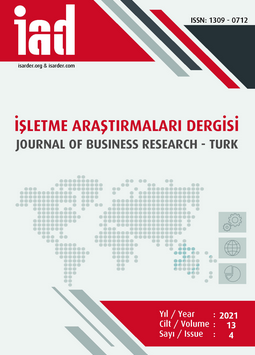Yöneticilerin Yetenek Yönetimi Yetkinliklerinin İşgörenlerin İşten Ayrılma Niyeti ile İlişkisinde Duygusal Bağlılık, Çalışmaya Tutkunluk ve İş Tatmininin Aracılık Rolü: Bankacılık Sektörü İşgörenleri Üzerine Bir Araştırma
The Mediating Roles of Affective Commitment, Work Engagement and Job Satisfaction on the Relationship Between Managers’ Talent Management Competencies and Employees’ Intention to Quit: A Research on Banking Sector Employees
Author(s): Hüseyin BozSubject(s): Organizational Psychology, Behaviorism, Management and complex organizations, Human Resources in Economy
Published by: Orhan Sağçolak
Keywords: Talent Management; Work Engagement; Affective Commitment; Job Satisfaction; Intention to Quit;
Summary/Abstract: Purpose –The main purpose of the study is to investigate the effect of the managers’ talent management competencies on the employees' intention to quit and whether the variables of affective commitment, work engagement and job satisfaction undertake a mediating role in this relationship. Design/methodology/approach – The data of the research were collected from 376 employees of 5 different banks operating in Antalya using the survey technique. The Talent Management Competencies Scale developed by Oehley (2007) was used to measure the perceived talent management competencies of managers in the study. The Utrecht Work Engagement Scale developed by Schaufeli et al. (2002) was used to determine the level of work engagement of employees. Affective commitment scale, which was developed by Allen and Meyer (1990) and is a part of the organizational commitment scale, was used to measure the affective commitment of employees. Minnesota Job Satisfaction Scale developed by Weiss et al. (1967) was used to measure employees’ job satisfaction. Rusbult’s et al. (1988) intention to quit scale was used to measure the employees’ intention to quit. The hypotheses of the research have been tested using structural equation modeling. Findings – Four hypotheses were tested in the study. Hypothesis 1 was accepted, which states that the managers’ talent management competencies have a direct negative effect on the employees' intention to quit. Hypothesis 2, which indicates the mediating role of affective commitment between managers’ talent management competencies and employees' intention to quit, was also accepted. Hypothesis 3, which indicates the mediating role of work engagement between managers' talent management competencies and employees' intention to quit, was not supported. Hypothesis 4, which indicates the mediating role of job satisfaction between managers' talent management competencies and employees' intention to quit, was supported. Discussion – Consistent with the literature, it is seen that the managers’ talent management competencies have a direct negative effect on employees’ intention to quit. In addition, again consistent with the literature, it is noteworthy that the affective commitment and job satisfaction of the employees play a mediating role between the managers’ talent management competencies and employees intention to quit. With the perception that their managers have high talent management competencies, talented employees whose affective commitment to the organization and their job satisfaction levels increase, move away from the intention of quit of the business.
Journal: İşletme Araştırmaları Dergisi
- Issue Year: 13/2021
- Issue No: 4
- Page Range: 3236-3264
- Page Count: 29
- Language: Turkish

